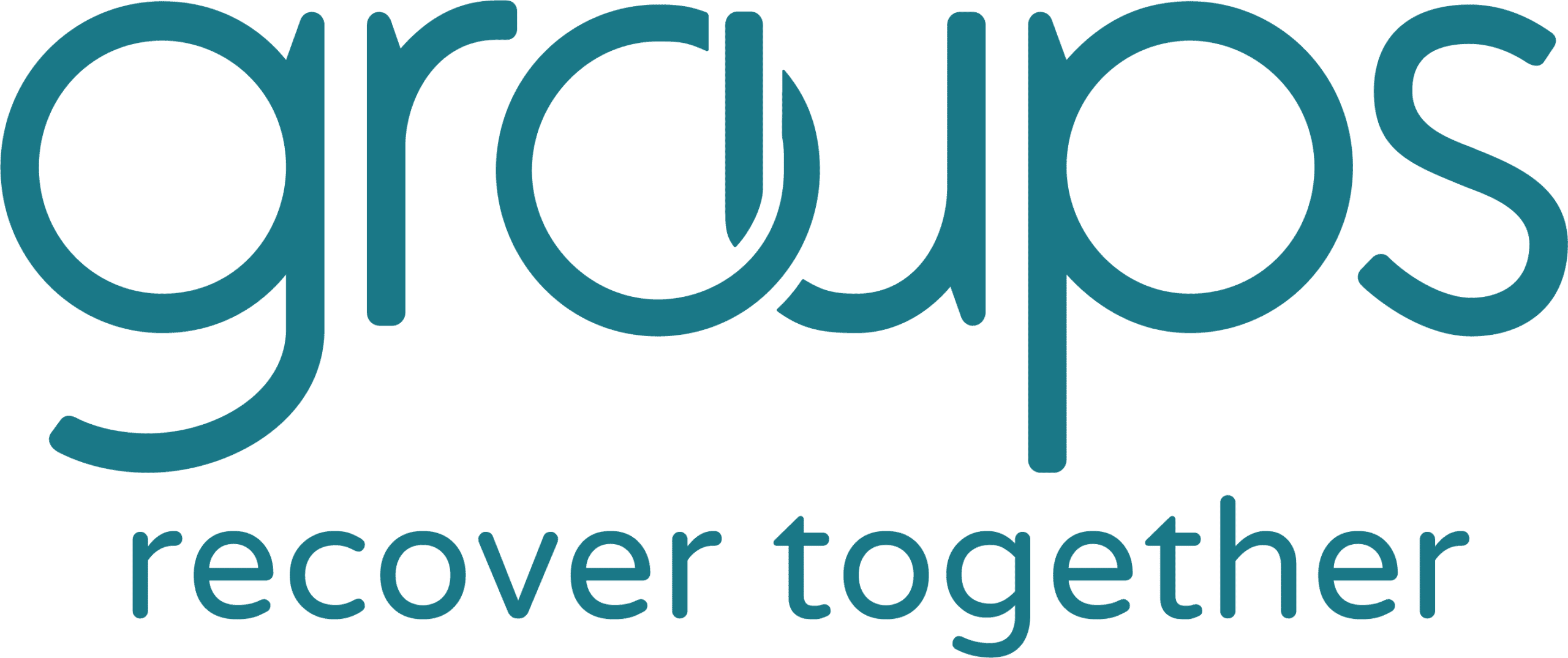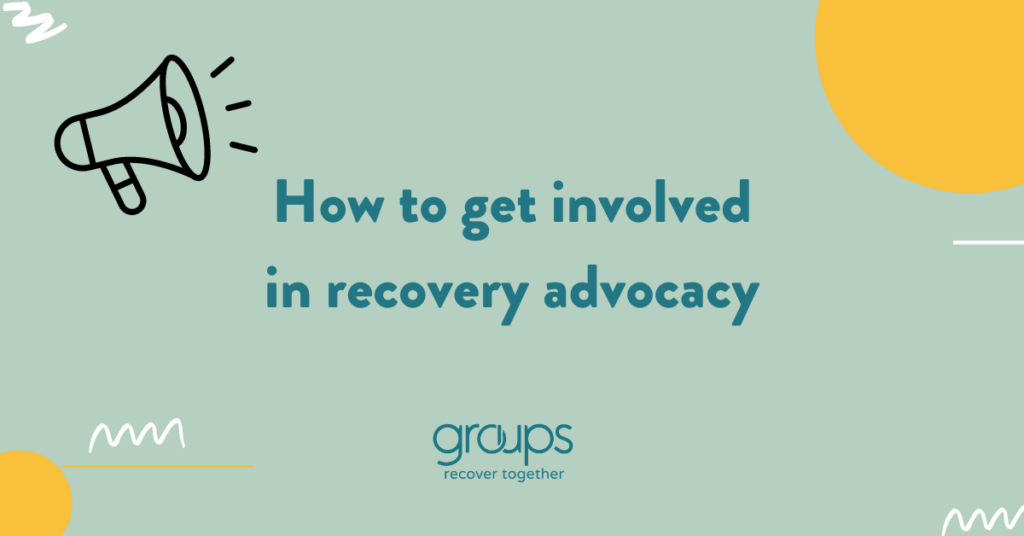Written by Tina Pettingill, MPH, Groups Recover Together’s Director of Government Affairs
Your voice has power. Advocacy is fueled by the millions of voices of people from the recovery community and their allies. For many people impacted by the opioid overdose epidemic, advocacy is a way to channel their loss or pain to help others. Sharing our lived experiences helps replace misinformation with understanding, misunderstanding with empathy, and denial with hope. Your voice can inspire policymakers to take action.
My role at Groups is to help create policy, regulatory, and cultural environments where our members can succeed. This really boils down to two major buckets of work: policy advocacy and building relationships. The basis to being successful in both these areas is educating people about the Groups model, the facts surrounding addiction, treatment, and recovery, and telling our stories. When people understand the complexity of addiction and hear about people’s recovery journeys, they are more likely to become our champions.
Interested in taking action to support people in recovery, people who were impacted by the overdose epidemic, and people who use drugs? Here’s how to get started.
Note: Groups does not endorse any specific organization mentioned in this document. However, we partner with them on advocacy for a variety of issues.
What is advocacy?
Advocacy is taking action to support a cause. Sometimes, the cause is passing or blocking a law or policy. Other times, it is simply improving the lives of a specific group of people.
Much of advocacy involves education. That could mean clearing up misinformation, fighting bias, and sharing facts about addiction.
There are many ways to advocate for the health and rights of people who use or formerly used opioids. Often, people use their voices to create change.
Common forms of advocacy include:
- Writing letters or emails to changemakers and key leaders. These can be an organization’s leadership or government officials.
- Calling changemakers and key leaders.
- Asking for meetings with key leaders. Sometimes, people respond better in person.
- Showing up to public hearings, town council meetings, and advocacy events.
- Sharing your story at a hearing, meeting, or event.
- Joining a coalition or advocacy group that aligns with your priorities.
What recovery advocacy can look like
Here are some examples of what recovery advocacy can look like in practice:
- A local pharmacy refuses to fill Suboxone prescriptions. You can ask to speak to the head pharmacist to talk through any potential stigma, the evidence that Suboxone saves lives, and encourage more education for pharmacists. If that person isn’t receptive, you can contact someone higher up at the pharmacy. Each state also has a pharmacy board that can be contacted with concerns. The Groups team is always here to help you advocate for yourself. If you experience issues with a pharmacy, contact the Rapid Response Team at 800-683-8313.
- A city health department is trying to open a syringe exchange program. There is a council meeting to discuss the program. You can email, call, or ask to meet with your council representative to discuss the evidence supporting harm reduction.
- Lawmakers have introduced a bill that would make it legal to possess fentanyl test strips in that state. You can email, call, or ask your State Representative to meet so you can explain the importance of test strips as a harm reduction tool. If you have a personal experience with fentanyl strips saving lives, you can tell the Representative your story and/or share it as part of a legislative hearing. Your advocacy can encourage them and other lawmakers to vote for and pass the bill.
- The Affordable Connectivity Act is a federal program that subsidizes high-speed internet for low-income individuals. Because it’s expiring, a bill has been introduced to continue funding the program. You can email, call, or ask to meet with your Congressional Representative to explain how internet connectivity is critical to health care and social and economic sustainability.
How to talk to government officials and other leaders
Knowing who you need to talk to when advocating for change is important. One way to start is by contacting your government officials.
Congress is a branch of the U.S. government that makes or changes federal law. It has two parts. The U.S. Senate represents the interests of whole states. The U.S. House of Representatives represents specific areas within states called congressional districts. Each state has two senators and at least one representative, depending on the population size.
States also have a state legislature. State legislature is the branch of the state government that makes or changes state laws, regulations and approves the budget. Most states have two parts to their legislature: the upper house, also called Senate, and the lower house, or House of Representatives.
Look up your state’s representatives.
You don’t need to be an expert on any particular issue to reach out to decision-makers. You just need to know why you’re reaching out and how the issue impacts you, your family, or your community.
When contacting your Representative or other government officials, keep these simple guidelines in mind:
- Know your basic facts about the issue. Never assume someone has accurate or any information.
- Name the bill, policy, or ordinance you are advocating for or against (if there is one).
- Get personal. Share your story and why the issue is important to you.
- Be concise and straightforward.
- Be polite.
- Offer your full name and contact details so they can get in touch with you.
How to get involved in recovery advocacy
Every state has one or more advocacy organizations that represent the recovery voice in state-level policy. These groups organize people around issues related to addiction, treatment, and recovery, as well as change at the local, state, and sometimes federal levels.
The following list is not comprehensive, but these organizations are a good place to start:
- Florida: Floridians for Recovery
- Indiana: Mental Health America of Indiana
- Kentucky: KY Harm Reduction Coalition
- Maine: Maine Recovery Advocacy Project
- New Hampshire: New Futures
- Tennessee: Prevention Alliance of TN
- Texas: Recovery People
- Virginia: Substance Abuse & Addiction Recovery Alliance of Virginia
- West Virginia: WV Association of Addiction and Prevention Professionals
National advocacy resources
Dozens of organizations offer resources, educational tools, and information on how, when, and why to advocate for important issues.
These are a few of our favorites:
- Legal Action Center: The Legal Action Center created an advocacy toolkit that can help people fight for their right to access medication for opioid use disorder (MOUD).
- Shatterproof: Shatterproof created a state advocacy toolkit and offers state and federal advocacy opportunities.
- Partnership to End Addiction: Partnership to End Addiction provides information, resources, and opportunities to get involved in advocacy.
- The Alliance for Rights and Recovery: The Alliance for Rights and Recovery is a coalition of grassroots advocates who fight for state and national change.
- Recovery Advocacy Project: The Recovery Advocacy Project is a network of people nationwide who advocate for addiction recovery policies.
Recovery advocacy at Groups
Groups plans to advance our legislative and advocacy efforts in the states where we operate in 2025. We will roll out opportunities to listen and learn from members as we prepare. Our members will be the first to know when there are specific ways to get involved.
Every one of us has something important to say. The only way for your voice to be heard is to speak out.




